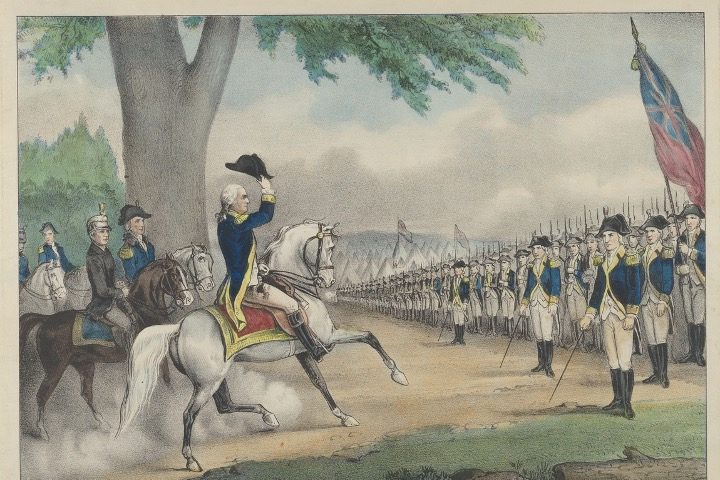
On June 14, 1775 — 248 years ago today — the Continental Congress, gathered in Philadelphia, took a significant step toward achieving lasting American independence by authorizing the mustering of the Continental Army. This pivotal event marked a turning point in the American War for Independence, as it formalized the establishment of a unified military force capable of challenging the might of the British Empire. The birth of the Continental Army not only symbolized a collective commitment to defend the rights and liberties of the American people, but also marked the birth of a union of states committed to a common cause: the cause of self-determination.
The events leading up to the formation of the Continental Army were shaped by escalating tensions between the American Colonies and the British Crown. Following the outbreak of hostilities at Lexington and Concord on April 19, 1775, it became clear that armed resistance was necessary to protect Colonial interests. The Second Continental Congress, convened in May, was tasked with the responsibility of organizing a unified defense against the British forces.
On June 14, 1775, the Congress passed a resolution to create a continental army to defend the Colonies. This move was prompted by several factors, including the need for a coordinated military response, the desire to legitimize the armed resistance, and the recognition that a more well-regulated and cohesive corps was critical if the Colonies hoped to match the formidable British military machine.
In a unanimous decision, the Continental Congress appointed George Washington, a respected Virginia delegate, as commander in chief of the new army. Washington’s military experience, leadership qualities, and reputation as a steadfast patriot made him an ideal choice for this crucial role. With his appointment, Washington became the figurehead of the revolution, embodying the hopes and aspirations of the American people.
The formation of the Continental Army was not without challenges. The army faced severe shortages of weapons, ammunition, and supplies, forcing soldiers to rely on donations from the Colonies and foreign allies. The lack of military experience and discipline among the soldiers also posed a significant obstacle. However, these challenges fostered a spirit of resilience and resourcefulness that would come to define the Continental Army.
Under Washington’s guidance, the army began to take shape. Initially composed of citizen militias from the several Colonies, the nascent forces underwent a slow but steady process of formalization, with the adoption of standardized uniforms and the establishment of a more traditional hierarchical command structure. The soldiers, most of whom were volunteers, underwent rigorous training to transform them into a disciplined and daunting fighting force.
The army faced its first major test at the Battle of Bunker Hill on June 17, 1775. Although a Pyrrhic victory for the British, the American soldiers demonstrated their determination and fighting prowess, earning respect and recognition from Congress and Parliament. This engagement bolstered the confidence of the Continental Army and served as a rallying cry for the cause of independence.
The creation of the Continental Army laid the foundation for the eventual victory of the American War for Independence. The army’s perseverance in the face of adversity, coupled with the unflappable leadership of George Washington, inspired a sense of esprit de corps and united the disparate Colonies in the joint venture to vouchsafe the blessings of liberty for their posterity.
The organization of the Continental Army on June 14, 1775, marked a critical moment in the galvanizing of the commitment of the Colonies to defend their rights and liberties, and it set in motion a series of events that would ultimately secure American independence. The bravery, resilience, and sacrifice of the soldiers remain an enduring testament to the spirit of freedom and self-determination that once defined the American people. The army’s formation on that fateful day solidified the Colonies’ resolve and signaled their readiness to confront the powerful British Empire and fight for their inherent rights with the zeal and cohesiveness of a united armed force.
Over the course of the American War for Independence, the Continental Army would face numerous challenges, endure harsh winters, suffer defeats, and experience victories. However, their unwavering commitment to the cause of liberty and the strategic brilliance of leaders such as George Washington would eventually turn the tide in favor of the Colonies.
The legacy of the Continental Army extends far beyond the years of the Revolutionary War. Its creation marked the birth of a distinct union, demonstrating that a diverse collection of colonies could unite to forge a common destiny. The experiences and lessons learned during those formative years would shape the future of the United States and lay the groundwork for the principles enshrined in the Declaration of Independence and U.S. Constitution.
Moreover, the spirit of the Continental Army continues to inspire generations of Americans. Its soldiers embodied the values of courage, sacrifice, and resilience that are integral to the perpetuation of liberty. The establishment of the army represented a significant step toward building a robust defense apparatus that would protect the young confederation in the years to come.
In conclusion, the creation of the Continental Army on June 14, 1775 was a historic milestone that marked the beginning of a transformative journey for the American Colonies. It represented a commitment to freedom, independence, and self-governance that would shape the future of the United States, and its legacy endures as a testament to the power of unity, determination, and the unyielding spirit of those who fought for a brighter future.



